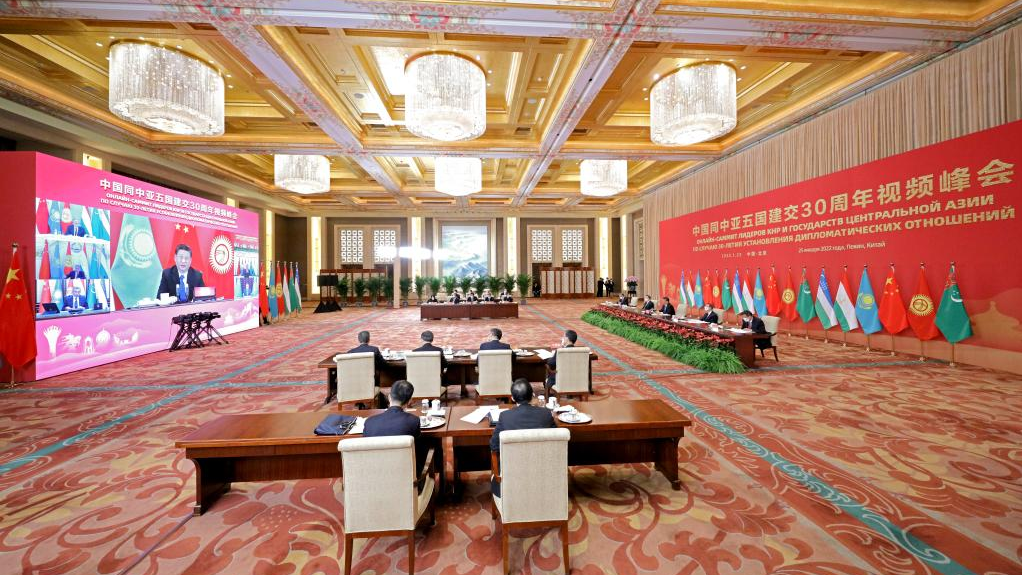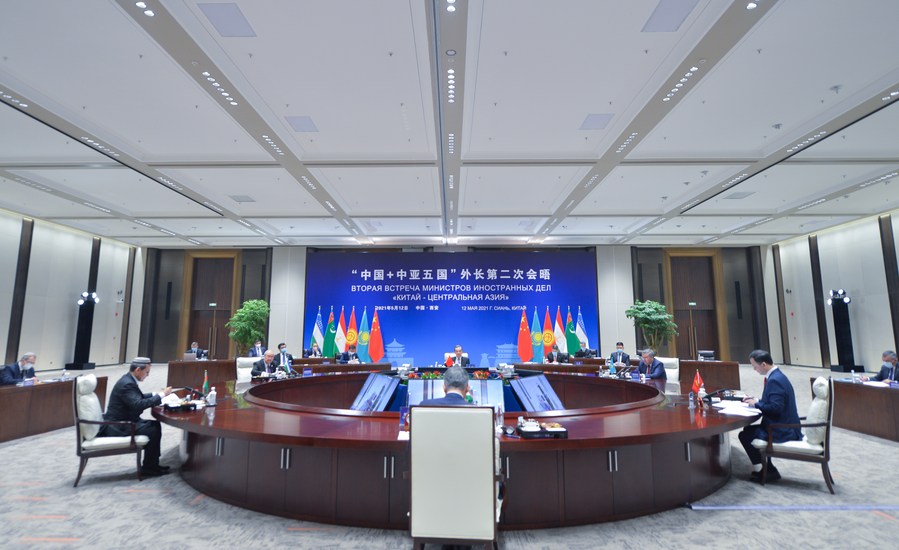
Chinese President Xi Jinping chairs a virtual summit commemorating the 30th anniversary of the establishment of diplomatic relations between China and five Central Asian countries in Beijing, China, January 25, 2022. /Xinhua
Chinese President Xi Jinping chairs a virtual summit commemorating the 30th anniversary of the establishment of diplomatic relations between China and five Central Asian countries in Beijing, China, January 25, 2022. /Xinhua
Editor's note: Deng Hao is the secretary general of the China Center for Shanghai Cooperation Organization Studies. The article reflects the author's opinions and not necessarily those of CGTN.
This year marks the 30th anniversary of the establishment of diplomatic relations between China and the five Central Asian countries. At this significant moment, President Xi Jinping, chairing a virtual summit in Beijing on January 25 to commemorate the 30th anniversary of diplomatic relations between China and Central Asian countries, delivered an important speech entitled "Joining Hands for a Shared Future."
A joint statement was also issued at this meeting. This is the first summit between the leaders of China and the five Central Asian countries, which demonstrates a new high level of cooperation between the two sides and marks a new era in the relations between China and Central Asian countries.
In his speech, President Xi Jinping comprehensively recalled the fruitful results of the 30 years of cooperation between China and Central Asian countries and brilliantly summarized the successful code of cooperation over the past three decades as four principles of mutual respect, good-neighborly friendship, solidarity and mutual benefit.
He also specified the goals and directions of future cooperation between China and Central Asian countries in five major fields: politics, economy, security, people-to-people exchanges and international affairs, and put forward a series of practical cooperation initiatives. President Xi's inspiring speech has profoundly elucidated the basic principles and guidelines for the development of China's relations with Central Asian countries, played a major role in guiding the future cooperation between the two and helped promote the establishment of a closer community with a shared future for China and Central Asian countries.
China and Central Asian countries are connected by mountains and waters and have unique geographical advantages. The two, being brought together by the world-famous Silk Road, have a long history of relations with the solid support of historical and cultural connections. China and Central Asian countries have a high degree of complementarity in transportation, resources and industries, and therefore, their economic cooperation maintains a strong internal impetus.

Chinese State Councilor and Foreign Minister Wang Yi hosts the second meeting of China + Central Asia (C+C5) foreign ministers meeting in Xi'an, capital of northwest China's Shaanxi Province, May 12, 2021. /Xinhua
Chinese State Councilor and Foreign Minister Wang Yi hosts the second meeting of China + Central Asia (C+C5) foreign ministers meeting in Xi'an, capital of northwest China's Shaanxi Province, May 12, 2021. /Xinhua
As developing countries, China and Central Asian countries hold similar views and positions on many regional and international issues, which has laid a profound basis for international cooperation between the two sides.
Over the past 30 years, with the joint efforts of both sides, the relations between China and the five Central Asian countries have extended from political-oriented relations to multi-pronged cooperation in politics, security, economy and people-to-people cooperation, from bilateral to multilateral cooperation, from friendly and cooperative relations to strategic partnership and from cooperation under the SCO and Belt and Road Initiative (BRI) to that under the "5+1" mechanism. These multiple leaps have not only brought tangible benefits and advantages to both sides but also helped build a closer community with a shared future for the two.
Looking forward to the future, China's relations with Central Asian countries have great potential and broader prospects. China's growing economic strength and vast market space have a lasting attraction to its immediate neighbors, Central Asian countries, which provide a basis for China's continued consolidation and the expansion of its influence in Central Asia.
China's proposal to promote the BRI with high quality is highly compatible with Central Asian countries' urgent desire and demand to upgrade their economies. Meanwhile, the BRI has a high degree of inclusiveness. All these will enable Central Asian countries to maintain enthusiasm and expectation on this initiative. The strong appeal of the Chinese proposals provides robust and sustainable support for China to further promote its connections with Central Asia.
It can be concluded that the two do not have fundamental conflicts of interest. On the contrary, their relations enjoy the support of a series of mechanisms and institutions. In this regard, China's relations with Central Asian countries will definitely have a brighter future.
(If you want to contribute and have specific expertise, please contact us at opinions@cgtn.com.)

